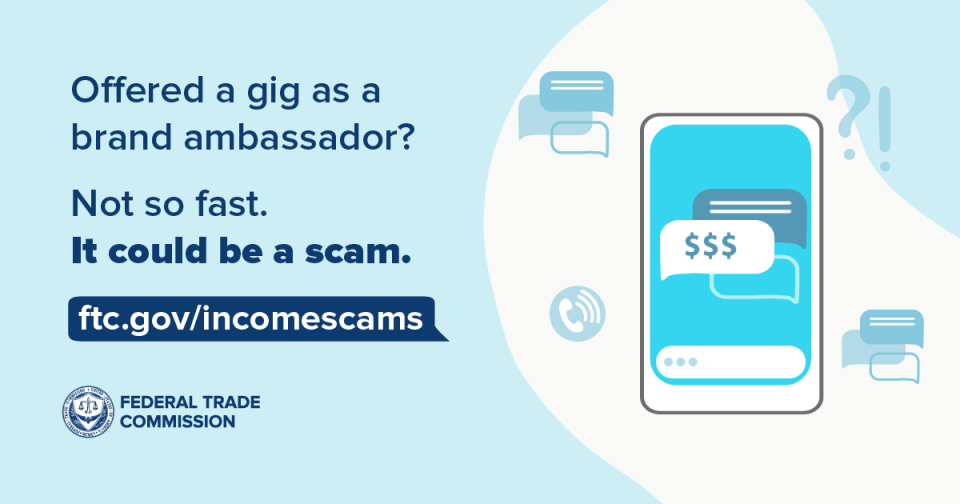Did you get a message from a “brand ambassador manager” for a national company wanting to pay you to promote their products online? It could be a scam…but how will you know?
If you’re an influencer or have lots of social media followers, scammers might target you with fake job offers aimed at getting your personal and financial information.
Here’s what it looks like: a supposed recruiter contacts you out of the blue, claiming to be affiliated with a brand you recognize. The job offer sounds great — they say they’ll send you free products to promote online and pay you big money to show and tag their products in your social media posts. All you have to do, they say, is accept the offer and give them your personal and banking information so they can pay you. They want to sign you up before you can ask any questions. But that’s a scam to get your information and steal from you.
So how can you spot a job scam like this one?
- Never give out your personal or financial information without doing some research first. Look up the name of the company along with words like “scam,” “review,” or “complaint.” The results may include the experiences of others who’ve lost money.
- Contact the company directly to confirm the offer. Use a phone number or contact method you know to be legitimate — not the contact info or website the so-called recruiter gave you. If you can’t confirm the offer is real, walk away.
- Spot the red flags. Is your recruiter using a personal account, email, or number not affiliated with the company they claim to represent? That’s a sign you could be dealing with a scammer.
Learn how to spot, avoid, and recover from job scams. Report fraud at ReportFraud.ftc.gov.


I don’t contract nobody thanks you so much
I was scammed by a large amount and did report to the FTC, as well as the Attorney General’s office, no one helped me! I reported to my bank within hours; due to my gut feeling and they didn’t contact me back after depositing $20,000, In a local Wells Fargo bank- they were supposedly from Arizona & I am from Wisconsin; my bank said the personal check I dropped off at the location they told me to, and iit was already cashed??? No help?
In reply to I was scammed by a large… by Tammie
Why would you give these people a $20,000.00 check. The check has the routing number of the bank and your checking account number on it. It is like giving them your social security number, date of birth, mothers maiden name, etc. About 12 years ago, my bank called me and told me that they were sending me a credit card that they wanted me to use for all of my bills and whatever else I need to purchase during each month. They told me to use it instead of a personal check because checks are not secure. With checking account numbers they can access your bank accounts linked to the checking account. With everything on the computer today, criminals can wipe you out in just a couple of minutes.
Thank you for this info.
I did receive a message from Brand Ambassadors.
Thank you for your vigilance & helpful tips on avoiding scams. They are getting smarter all the time, it seems. I'm about ready to return to paper & pencil! I'm 82, but thankfully have full deck of marbles, if that's the right mixed metaphor.